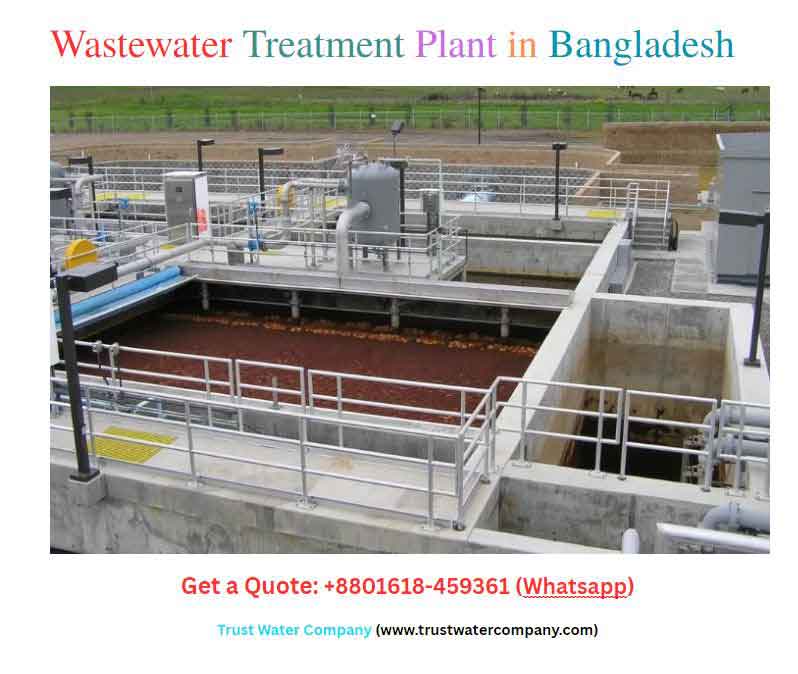A Guide to Wastewater Treatment Plant Suppliers in Bangladesh
Bangladesh, a nation brimming with vibrant culture and economic potential, faces a crucial challenge: ensuring clean water for its people and protecting its environment. As the country strides towards industrial growth, the issue of wastewater treatment becomes paramount. Fortunately, a new wave of reliable wastewater treatment plant suppliers in Bangladesh are emerging, offering innovative solutions for a sustainable future.
This comprehensive guide dives deep into the world of wastewater treatment in Bangladesh, exploring the types of plants available, the challenges faced, and the benefits of implementing these crucial systems. We’ll also shine a light on some of the leading ETP manufacturers in Bangladesh, empowering you to make informed decisions for your industrial needs.

The Looming Threat: Industrial Wastewater and its Perils
Bangladesh’s booming industries, particularly textiles and garments, are a cornerstone of its economy. However, the flip side of this progress is the generation of significant volumes of industrial wastewater. This untreated effluent often contains harmful contaminants like heavy metals, dyes, and organic matter. When discharged into rivers and streams, it wreaks havoc on aquatic ecosystems, contaminates drinking water sources, and poses a serious threat to public health.
Taking a Stand: Government Regulations and Environmental Compliance
The Bangladeshi government has rightfully recognized the gravity of this issue. Stringent government regulations on effluent treatment in Bangladesh have been implemented, mandating industries to install and maintain ETP plants. These regulations outline effluent discharge standards in Bangladesh, ensuring that treated wastewater meets specific criteria before being released into the environment.
Navigating the Maze: Types of Wastewater Treatment Plants in Bangladesh
The good news? A diverse range of wastewater treatment plants in Bangladesh cater to various industrial needs and capacities. Here’s a breakdown of some common types:
- Activated Sludge Process (ASP): This biological treatment method utilizes microorganisms to break down organic matter in wastewater. It’s a popular choice for its efficiency and versatility.
- Anaerobic Digestion: This process employs bacteria that thrive in the absence of oxygen to decompose organic waste. It also generates biogas, a renewable energy source.
- Chemical Precipitation: This method involves adding chemicals to cause pollutants to clump together and settle out of the wastewater, making it easier to remove them.
- Membrane Filtration: This advanced technology utilizes semi-permeable membranes to separate contaminants from treated water. It’s particularly effective for removing microscopic pollutants.
Cost Considerations: Balancing Budget and Sustainability
Naturally, the cost of an ETP plant in Bangladesh is a crucial factor. Prices vary depending on the plant’s size, capacity, and the complexity of the treatment process required. However, remember, low-cost ETPs in Bangladesh might not always be the wisest investment in the long run. Opting for affordable ETP plants that prioritize efficiency and long-term sustainability can be more cost-effective in the end. Consider factors like operation and maintenance costs, energy consumption, and the need for future upgrades.
Finding the Right Fit: Leading ETP Plant Suppliers in Bangladesh
With the growing demand for industrial effluent treatment in Bangladesh, a number of reputable ETP plant suppliers have established themselves. Here are some key considerations when searching for a supplier:
- Experience and Expertise: Look for companies with a proven track record of designing and installing ETP plants that comply with ETP plant compliance in Bangladesh.
- Technology and Innovation: Choose a supplier that stays abreast of the latest industrial effluent treatment technology in Bangladesh, offering solutions that are efficient, sustainable, and meet your specific needs.
- After-Sales Support: Reliable after-sales support is crucial for ensuring the smooth operation and maintenance of your ETP plant.
A Glimpse into the Future: Sustainable Solutions and Beyond
The future of wastewater treatment in Bangladesh is bright. Sustainable ETP solutions are constantly being developed, prioritizing water reuse and minimizing waste generation. Technologies like zero liquid discharge (ZLD) are gaining traction, allowing for the complete recovery of treated water for industrial processes. Additionally, public-private partnerships can play a vital role in accelerating ETP development in Bangladesh, ensuring widespread adoption of these crucial systems.
Conclusion: A Collective Journey Towards Clean Water
The journey towards clean water in Bangladesh requires a concerted effort from industries, government agencies, and wastewater treatment specialists. By embracing innovative wastewater treatment technologies and partnering with reliable ETP plant suppliers, Bangladesh can not only safeguard its precious water resources but also pave the way for a healthier, more sustainable future for all.
FAQs
How much does a wastewater treatment plant cost in Bangladesh?
The cost of an ETP in Bangladesh varies depending on size, capacity, and treatment complexity. Low-cost options exist, but consider long-term value. Affordable plants with high efficiency and future-proofing might be more cost-effective.
What are some reputable wastewater treatment plant suppliers?
Look for companies with experience, expertise in complying with regulations, and a commitment to sustainable solutions. Research companies like Green Dot Limited, City Water Purifier, and Greenify Environmental Technology for a starting point.
What are the different types of wastewater treatment plants available?
Common options include activated sludge process (ASP) for its versatility, anaerobic digestion for generating biogas, chemical precipitation for removing pollutants, and membrane filtration for advanced treatment.
